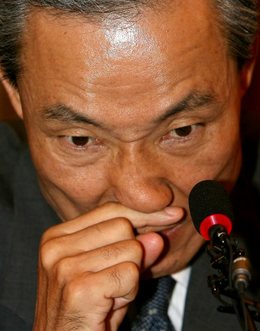 |
|
Korea's top negotiator for Free Trade Agreements between Korea and the U.S. Kim Jong-hoon is holding a press conference at a hotel in Seoul on July 11.
|
With one day of negotiations left, disagreements linger
South Korea and the United States have made no strides in the second round of free trade agreement (FTA) talks, as major differences between the two sides loom over the final day of discussions. South Korea and the U.S. have failed to exchange concessions on agriculture, merchandise tariffs, and textiles during the talks, delaying the concessions to early next month. In the case of agriculture and textiles, there was virtually no agreement in principle between the two sides. Kim Jong-hoon, South Korea’s top negotiator, said in a press briefing on July 13 that "both nations agreed on basic principles to separate merchandise tariff abolition into five stages.” However, which items will fall under which time frame remains an issue of contention.Under the agreement, South Korea and the U.S. will abolish tariffs on merchandise within five periods of time: instantaneously, within three years, five years, 10 years, and then other agreed-upon time frames. "Sensitive items can be protected by excluding them from the concessions or abolishing tariffs after 10 years" or more, Kim said. On the talks on textiles that ended July 12, the two sides failed to reach a basic agreement, as the U.S. rejected South Korea’s demand that Washington abolish tariffs on all textile goods within five years. In agriculture, South Korea requested the U.S. to abolish tariffs in the next 20 years, but Washington demanded Seoul scrap the tariffs within 10 years. No progress was made in South Korea’s request to allow the U.S. to recognize goods made in the joint Korean Kaesong (Gaeseong) industrial park in North Korea as originating from South Korea. South Korea presented evidence of 65 separate exceptional cases concerning the origin of goods which were included in free trade agreements. In regards to South Korea’s desire for the national postal agency to continue to offer finance services, the U.S. said the agency should be checked by financial regulators and make its business transactions known publicly. Top U.S. negotiator Wendy Cutler unofficially met senior officials of the presidential office and trade minister Ban Ki-moon and expressed concerns about South Korea’s pharmaceutical-pricing policy. Since July 11, the U.S. has refused to negotiate on pharmaceuticals and medical equipment due to disagreement with the South Korean position. Among 18 sectors for discussion during this round, South Korea and the U.S. completed all except four sectors: investment, the service sector, the environment, and how to resolve individual trade disputes in the future. However, concessions were exchanged on one issue only, the ability for foreign companies to bid on certain government contracts.






